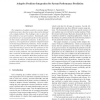Free Online Productivity Tools
i2Speak
i2Symbol
i2OCR
iTex2Img
iWeb2Print
iWeb2Shot
i2Type
iPdf2Split
iPdf2Merge
i2Bopomofo
i2Arabic
i2Style
i2Image
i2PDF
iLatex2Rtf
Sci2ools
IPPS
2007
IEEE
2007
IEEE
Adaptive Predictor Integration for System Performance Prediction
The integration of multiple predictors promises higher prediction accuracy than the accuracy that can be obtained with a single predictor. The challenge is how to select the best predictor at any given moment. Traditionally, multiple predictors are run in parallel and the one that generates the best result is selected for prediction. In this paper, we propose a novel approach for predictor integration based on the learning of historical predictions. It uses classification algorithms such as k-Nearest Neighbor (k-NN) based supervised learning to forecast the best predictor for the workload under study. Then only the forecasted best predictor is run for prediction. Our experimental results show that it achieved 20.18% higher best predictor forecasting accuracy than the cumulative MSE based predictor selection approach used in the popular Network Weather Service system. In addition, it outperformed the observed most accurate single predictor in the pool for 44.23% of the performance tra...
Distributed And Parallel Computing | IPPS 2007 | Multiple Predictors | Predictor Integration | Single Predictor |
Related Content
| Added | 03 Jun 2010 |
| Updated | 03 Jun 2010 |
| Type | Conference |
| Year | 2007 |
| Where | IPPS |
| Authors | Jian Zhang, Renato J. O. Figueiredo |
Comments (0)

